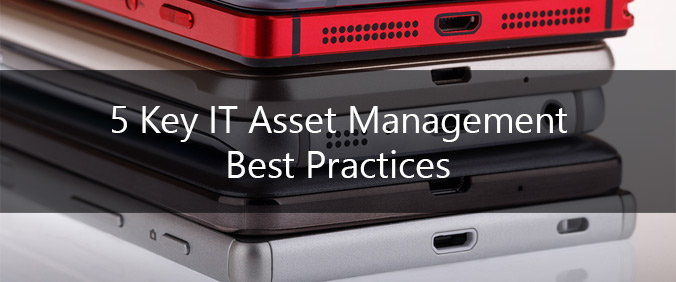
5 Key IT Asset Management Best Practices
You may think that IT asset management is only for large enterprises and corporations. After all, they have a plethora of IT resources to manage. However, even a small-business can benefit from a strong IT asset management plan. By implementing a set of IT asset management best practices, your business can mitigate risk, more effectively negotiate service and equipment contracts, and build relationships with technology vendors.
IT Asset Management Best Practices
An IT asset is any device, software, or data your company owns and uses to conduct business. IT asset management, refers to the “set of business practices for optimizing spending and supporting strategic decision making within the IT environment while also increasing the company-wide understanding of IT’s business value,” as TechTarget states. Whether your business decides to purchase an IT asset management system or work with a procurement specialist, these five IT asset management best practices can help you save money and manage assets more effectively:
- Get a depreciation calculator. If your business is like most, your employees have more than one company-owned device. To get the most from those devices and avoid buying replacements too soon or too late, it’s important to track the value of those devices.
- Geolocation services are important. Even with Find My iPhone and similar tools, you will need geolocation services. This feature tracks the location of company-owned devices, who devices are assigned to, and how each device is configured.
- Remote control is a must. With so many employees telecommuting or traveling, your IT professional must have a way to troubleshoot devices remotely or prevent a security breach if a device is lost or stolen.
- Use a directory service. A Lightweight Directory Access Protocol directory service like Microsoft Active Directory lets you store and manage software licenses, user names and passwords, access rights, and more to maintain compliance and manage your IT assets.
- Keep your assets secure. Whatever solution you choose to manage your IT assets, make sure it’s secure and allows multi-factor or two-factor authentication.
Is a Procurement Specialist Right for Your Business?
If your business decides to work with a procurement specialist, that doesn’t mean that you and your IT staff are no longer involved in buying decisions. As Mary Pratt of Computerworld notes, “Procurement partnering isn’t about IT blindly handing over responsibilities or gleefully dumping a mountain of routine paperwork on the desks of highly skilled sourcing staffers.” Rather, it’s the partnership between technology procurement specialists and those responsible for IT management to get the best value.
A procurement specialist will provide an outside perspective on budgeting that will prevent future costs from getting out of control. And, by partnering with a technology procurement specialist, you gain negotiating power for cost savings on hardware and software. Not to mention, you will realize significant time-savings since most IT service providers already have technology procurement best practices within their skill set.
There is no need to reinvent the wheel. All Phases IT offers IT support services for small-businesses that eliminate challenges associated with buying, selling, and managing office computer equipment. Contact us today to request a 30-minute phone consultation and evaluation of your IT environment.



